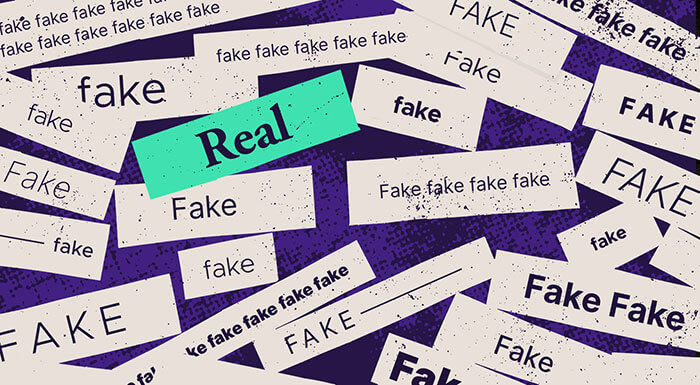What is misinformation? What is disinformation?
Misinformation, disinformation – you’ve probably heard these terms in the past and wondered if and how they differ in meaning. It’s the intention that distinguishes them: Misinformation is any type of false information that people might fall for. It’s verifiably incorrect or misleading but hasn’t been created or shared with the intention to deceive people. Disinformation, on the other hand, is created and spread in order to misinform and reach a certain goal.
Ultimately, both misinformation and disinformation can be harmful. It’s not only that people will believe incorrect information, false information costs the global economy a lot of money and can threaten democracy and efficient governance. And it’s difficult to stop because false news spreads significantly faster, deeper and more broadly than news that is correct.

Where does false information show up?
You can come across misinformation and disinformation everywhere but it is most widespread and impactful when shared online. Algorithms and tracking have increased the ability for misinformation and disinformation to reach a larger audience on websites, blogs, forums and social networks.
You may have heard about tracking primarily in the context of advertising. However, it’s also a powerful tool when it comes to the spread of false information. Why is that? When you browse the internet or your social network feed, your behavior, interests, contacts in some instances and more are tracked by various parties across websites in order to create an extremely detailed profile of you to sell to others without your knowledge or consent. These profiles are used for personalized advertising but can also serve to present any kind of targeted information to you.
When you receive content recommendations on any website or social network, it’s often because an algorithm presents information based on your profile information. Unfortunately, although algorithms are getting smarter and smarter, they don’t check content for accuracy. This is particularly problematic with social media: These networks surface countless pieces of information for their users every day and have access to almost unlimited content including user posts, news articles, ads and sponsored content. While posts and articles may accidentally spread misinformation, ads and sponsored content can be used to target you deliberately with disinformation to manipulate you, making it essential you know how to identify misinformation.
How to spot false information online and help stop the spread
-
Look at the URL and/or the source.
Is it known to be credible? If you’re not sure, try to find out more about the source and its reputation on the internet.
-
Is the headline overly sensational?
Check out websites and news outlets that you trust to see if and how they report on the same topic. Content that is intended to manipulate will often use extremes and exaggerations for which there is no evidence and will not be found in well-researched reporting.
-
Is the content up to date?
Outdated information is not necessarily meant to disinform, but it may not be factually correct any longer.
-
Did the author publish other articles or posts, ideally also in credible publications?
If you only find the author’s name on questionable sites, you should not pay too much importance to their statements.
-
Do images and captions match?
Images are a very powerful tool for targeted disinformation. Depending on the caption, the perception can be twisted into the absolute opposite. If you are unsure, perform a reverse image search to find out how the image is described on other sites.
How Firefox helps you avoid misinformation
Firefox keeps trackers in check:
As mentioned before, tracking plays a big role in the spread of misinformation. Using Firefox with Enhanced Tracking Protection helps by blocking third-party trackers from many advertisers and other players by default when you browse the web, so that you gain back control over your online data.

Firefox helps to keep your social media feeds clean:
Social networks know a lot about you. Plus, they’re able to track you beyond their platforms with their Share and Like buttons despite Tracking Protection — even if you don’t have an account. The Facebook Container for Firefox makes sure that Facebook and Instagram can’t do this so easily, which again reduces the probability of seeing misinformation via ads and promoted content significantly.

Firefox helps you surface content that’s worthy of your time:
When you open a new tab in your Firefox browser, you’ll see articles recommended by Pocket. Pocket doesn’t use any of your personal data to make recommendations. Instead, the articles are curated by real people using the app. The ability to discover new stories, angles, and opinions is one way to battle the spread of misinformation. To get even more recommendations, subscribe to the Pocket newsletter and download the Pocket app.
-
Why trust Firefox?
Because we put people first. In fact, we’re backed by a non-profit. From day one, it’s been our mission to protect the internet and everyone on it.
-
Your privacy, by the product
Firefox products work differently — because they’re designed to protect your privacy first.
